牛津高一模块一unit 2 growing pains[上学期]
文档属性
| 名称 | 牛津高一模块一unit 2 growing pains[上学期] |
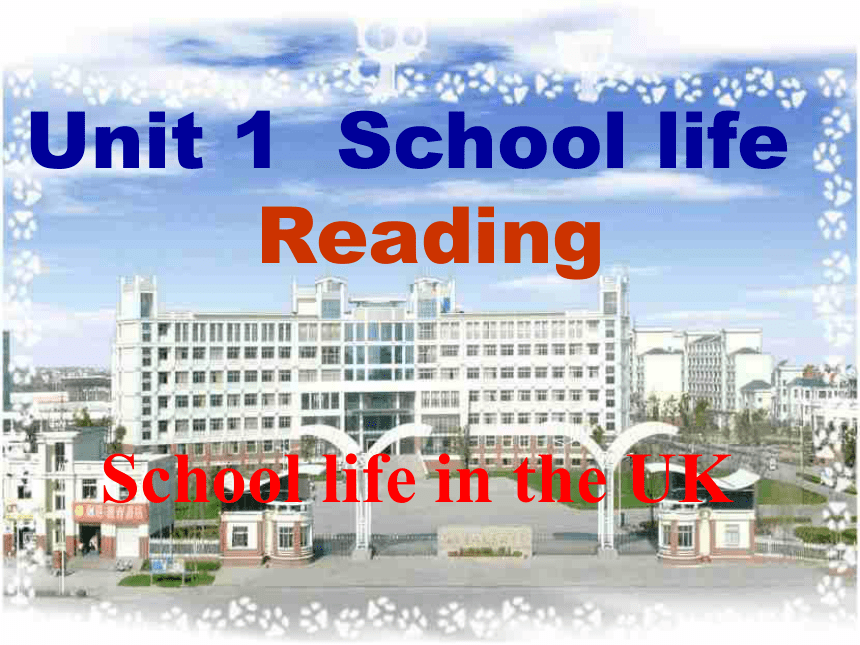
|
|
| 格式 | rar | ||
| 文件大小 | 1.7MB | ||
| 资源类型 | 教案 | ||
| 版本资源 | 牛津译林版 | ||
| 科目 | 英语 | ||
| 更新时间 | 2006-11-13 00:00:00 | ||
图片预览




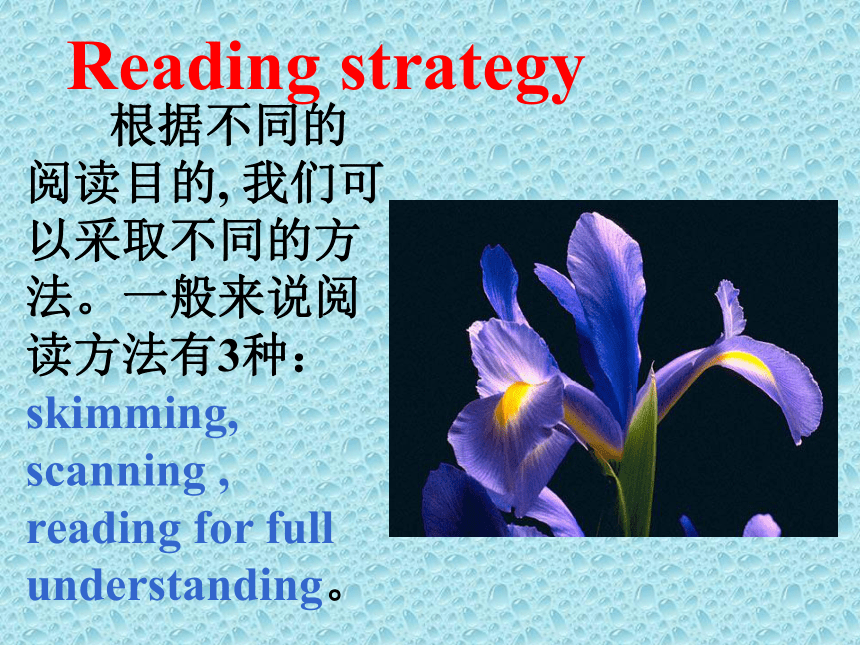
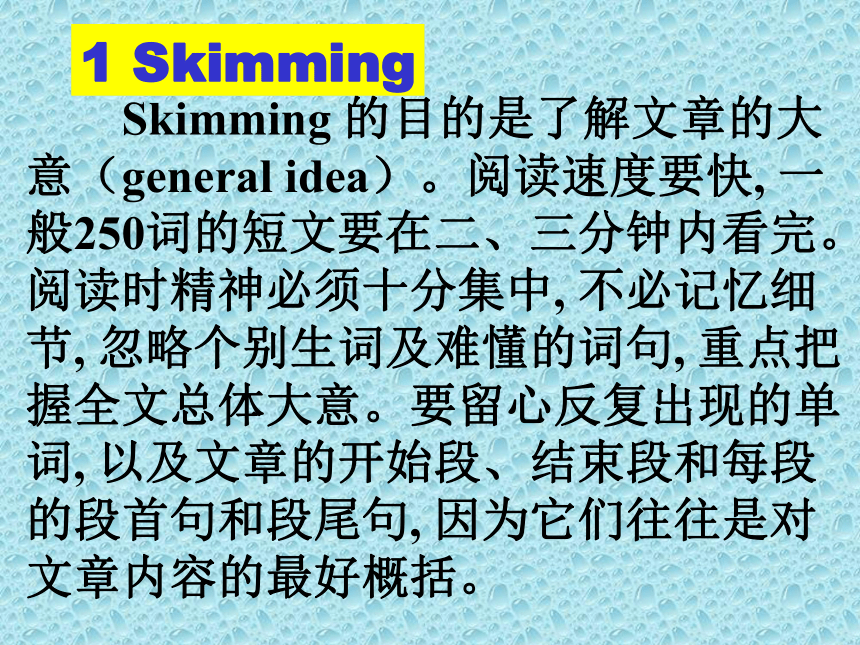
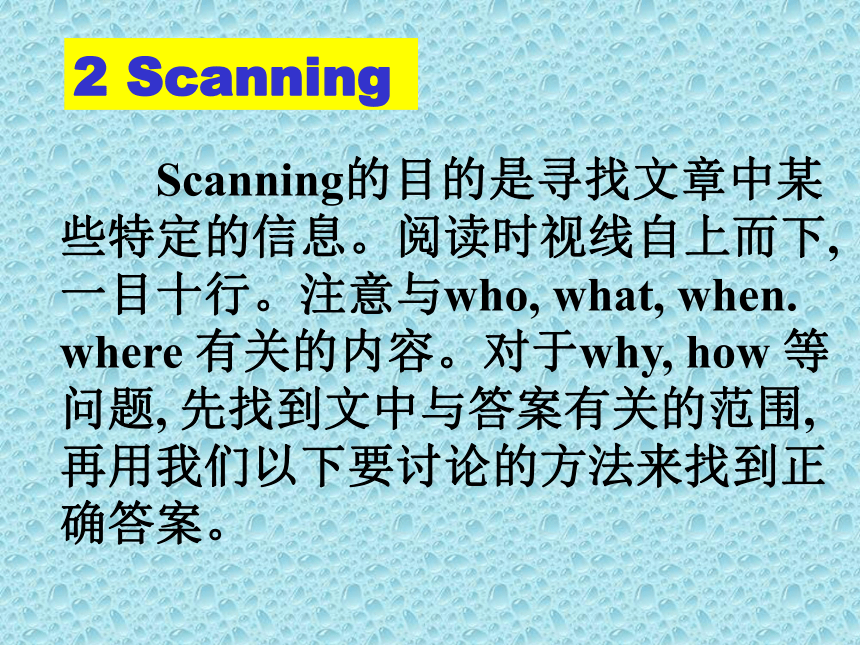
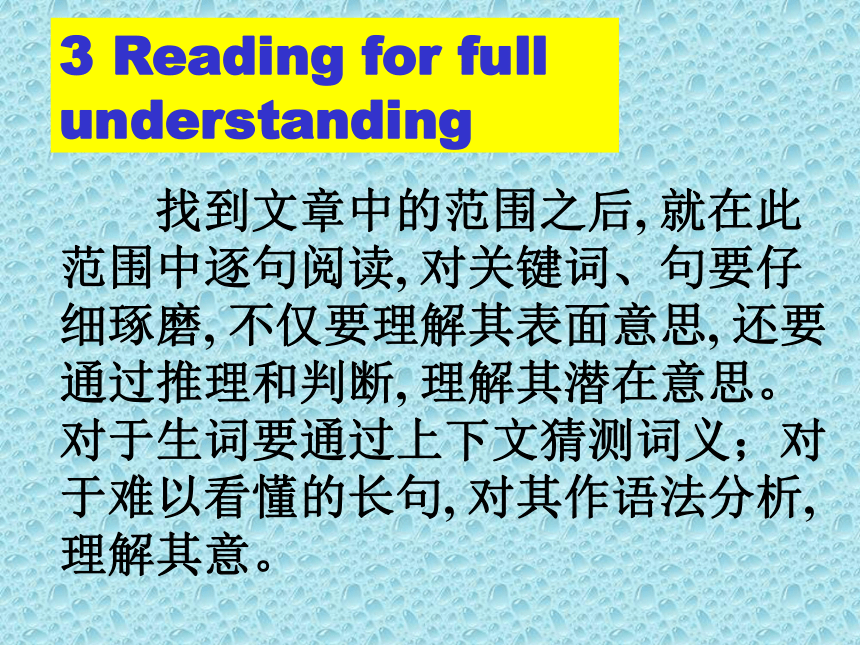
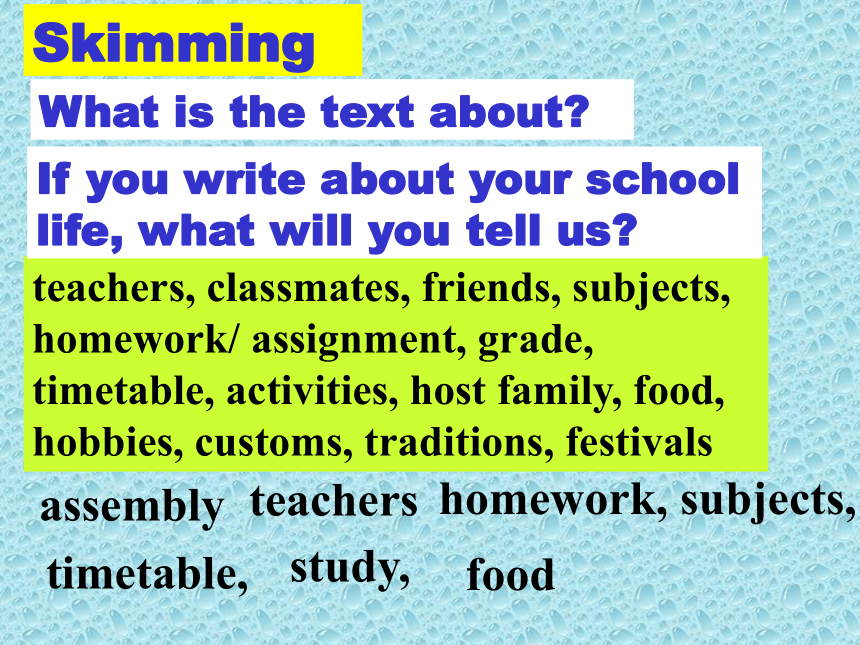

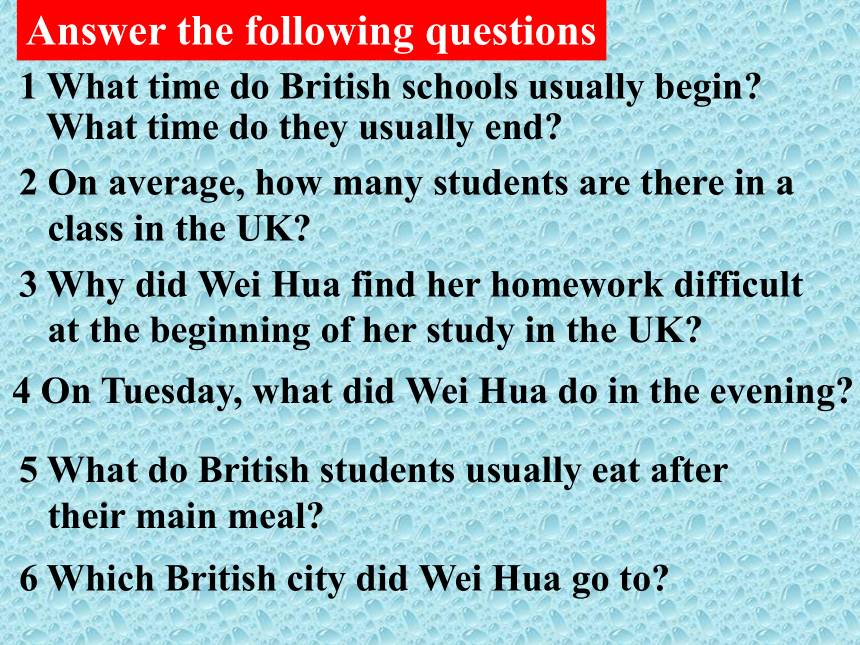
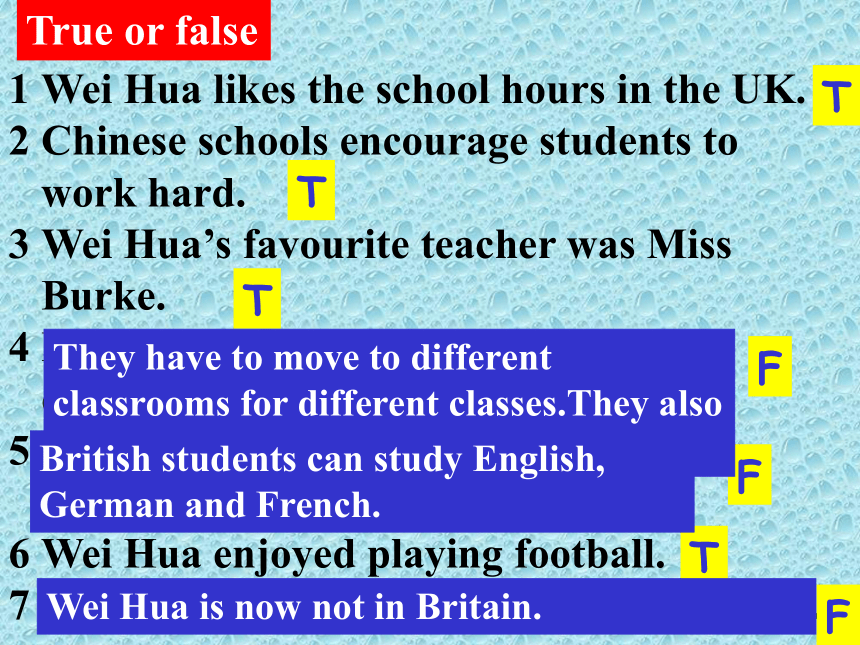
文档简介
课件51张PPT。Unit 1 School life
Reading School life in the UK 根据不同的阅读目的, 我们可以采取不同的方法。一般来说阅读方法有3种:skimming, scanning , reading for full understanding。
Reading strategy Skimming 的目的是了解文章的大意(general idea)。阅读速度要快, 一般250词的短文要在二、三分钟内看完。阅读时精神必须十分集中, 不必记忆细节, 忽略个别生词及难懂的词句, 重点把握全文总体大意。要留心反复出现的单词, 以及文章的开始段、结束段和每段的段首句和段尾句, 因为它们往往是对文章内容的最好概括。
1 Skimming Scanning的目的是寻找文章中某些特定的信息。阅读时视线自上而下, 一目十行。注意与who, what, when. where 有关的内容。对于why, how 等问题, 先找到文中与答案有关的范围, 再用我们以下要讨论的方法来找到正确答案。
2 Scanning 找到文章中的范围之后, 就在此范围中逐句阅读, 对关键词、句要仔细琢磨, 不仅要理解其表面意思, 还要通过推理和判断, 理解其潜在意思。对于生词要通过上下文猜测词义;对于难以看懂的长句, 对其作语法分析, 理解其意。
3 Reading for full understandingSkimmingstudy, What is the text about?teachers, classmates, friends, subjects, homework/ assignment, grade, timetable, activities, host family, food, hobbies, customs, traditions, festivalsassemblyteachershomework, subjects,timetable, foodIf you write about your school life, what will you tell us?1 How long did Wei Hua stay in Britain?2 What was the name of Wei Hua’s class
teacher?3 What did Wei Hua make in her
Woodwork class?For one year.Mr Heywood.A small talbe.2 Scanning 6 Which British city did Wei Hua go to?Answer the following questions1 What time do British schools usually begin?What time do they usually end?2 On average, how many students are there in a
class in the UK?3 Why did Wei Hua find her homework difficult
at the beginning of her study in the UK?4 On Tuesday, what did Wei Hua do in the evening?5 What do British students usually eat after
their main meal?True or false1 Wei Hua likes the school hours in the UK.
2 Chinese schools encourage students to
work hard.
3 Wei Hua’s favourite teacher was Miss
Burke.
4 British students always have the same
classrooms and classmates.
5 British students can only study two
languages: English and French.
6 Wei Hua enjoyed playing football.
7 Wei Hua is now back in Manchester again.
TTTTFFFThey have to move to different classrooms for different classes.They also have different students in some classes.British students can study English, German and French.Wei Hua is now not in Britain.Homework
Read the text and find out the words or phrases that you don’t understand, discuss with your partner or look them up in your dictionary.Language Points:
1. Going to a British school for one year was a very enjoyable experience for me.
Playing with fire is dangerous.
Smoking is not allowed here.
Seeing is believing.
His hobby is collecting stamps.2. experience
1) [U]经验
Have you had any experience in work of this sort?
你对这工作有经验吗?
Experience comes from practice.
经验来源于实践。
Only women with experience of office work can apply for the position.
She is a teacher with more than 20 years' experience in teaching.2) [C] 经历
The car accident was a terrible experience to him.
Please tell us your experiences of living abroad for so many years.
Flying along the express way is an unforgettable experience.3) vt 体验
He experienced the greatest hardship for the first time in his life.
体验困苦
Experiencing pain is as valuable as experiencing pleasure.
4) experienced有经验的
An experienced doctor is operating on the wounded soldier.
Anyone experienced in drawing may come tomorrow.3.mean ( meant meant)
mean doing/n./that clause “意味着,意思是”;mean to do “意欲,打算”
The new order means (us) working overtime.
意味着(我们)加班。
If you miss this train, that will mean waiting for another 30 minutes.
I mean that you are being unfair.
He meant to cause trouble.
他是成心惹麻烦。
4. usual adj.=customary“通常的”“习惯上”
Tea is the usual drink of Chinese people.
This is his usual seat.
He arrived later than usual.
as usual“象往常一样”
As usual he forgot to make his bed after he got up.assemblyassemblyassembly
5. assembly
the school assembly校会
the city assembly市议会
the Assembly众议院
6. attend= go to
Did you attend the meeting yesterday?
She was sick so she didn't attend her classes.
She has two nurses attending (on/upon) her.
有两位护士看护着她。
attend a lecture / a party / a meeting
attend school
attend church
7. earn
He earns his living by teaching at a school.
Though she is young, but she earns a good salary.
He earned a lot of praise from the papers for the way he handled the strike.
由于他对罢工的处理(方法)得当,他博得了报界的不少好评。8. respect
1) n.尊敬,尊重
Show some respect to your parents.
Have some respect for your parents.
He has no respect for the feelings of others.
他毫不在意别人的感受。
2)v.t.尊敬,尊重
He's a man much respected by all his colleagues.
We respect him as a great leader.
我们尊他为伟大的领袖。
I deeply respect your courage.
respectable受人尊敬的
respectful恭敬的
9. achieve
1) to finish successfully 完成,做到
He will never achieve anything if he doesn't work hard.
如果他不加紧努力,他会一事无成。
2) gain 达到,实现
He achieved his goal.
他达到了他的目的。
achieve success
achievement10. grade
1)等级,分数
He is not in the first grade as a musician.
他不是一流的音乐家。
She got good grades last term.
low-grade apples
次等的苹果
2)年级
My sister is studying in class one, grade two.11. sound (like)
That sounds like a good idea.
I wouldn't buy that guitar. It sounds like a bit cheap.
You sounded delighted.12. average
1) n. 平均数 平常 普通
The average of 4 and 10 is 7.
His school work is well above / below average.
We receive 20 letters a day on average.
2) adj.平均的 平常的 普通的
What is the average rainfall for July?
There is nothing special about the film. It was only average (一般) .
3)v 平均达到
Our mail averages 20 letters a day.
I average eight hours' work a day.13. used to过去常,
be used to 被用来,
be used to (doing/n.) 习惯于
I used to go to school by bike and now I am used to walking to school.
Bamboo is usually used to make paper.
I am not used to the food in Hunan.14. a bit 与a little
1.都用于修饰形容词,副词的原级或比较级.
2.a little可直接修饰名词;a bit 需加of后方可.
3.not a bit 意为“一点也不(=not at all)”; not a little意为“很,非常(=very/very much)” .
I’m a little/a bit tired.
It’s a bit/a little warmer today.
Ann doesn’t care a bit for me.
She was not a little worried about the exam.
15. challenge (difficult in an interesting way that tests your ability )
邀请,向……挑战
I challenge him to a game of tennis.
I challenge you to race me across the lake.
She finds her new job very challenging.
16. improve
If the company refuses to improve its pay offer, we shall go on strike.
改进工资方案
Let's hope the weather improves before Saturday.
The wine improves with age.
酒存放得越久越醇。17. extra (more than usual)
I need some extra money.
我需要一些额外的钱。
I'm going to work extra hard.
特别努力
18. prepare (make sth. ready)
prepare the meal
Will you help me prepare for the party?
Preparation n.19. drop
1)to fall or let fall
She dropped her glasses and broke them.
The apple dropped (down) from the tree.
The temperature has dropped.
2) give up
I'm going to drop history this year.
When the fire alarm rang I dropped everything and ran out of the building.
扔下手中的活儿20. relax
Sit down and relax.
The music will help to relax you.
relaxation
relaxed
He was lying in the sun looking very relaxed and happy.
21. desserts (sweet food eaten at the end of a meal )
Words (Part D )1 attend
2 earn
3 challenging
4 extra
5 prepare
6 drop
7 dessertsA difficult in an interesting
way that tests your ability
B make something ready
C give up
D go to
E more than usual
F sweet food eaten at the end of
a meal
G get something because you
have done something goodDiscussion:
1.Should students learn more languages? Why or why not?
2.What subjects would you like to take if you could choose? Why?
Homework
1.Finish off all the exercises on reading.
2.Have a further discussion with your partner about the topics in Part F.
3.Make at least one sentence with these words or phrases in your exercise book, and hand it next Monday.
a. experience; b. respect; c. sound like; d. average; e. used to; f. be used to; g. extra; h. stop doing; i. the best way to do; j. difference. Thank you!Language points1.run 用作及物动词,意为 “经营” “管理” “办(工厂、学校等)”
Who is running the restaurant now?
His uncle runs a small factory.
作及物动词,意为 “使奔跑” “参加比赛” “追捕” “追查”
Never let children run the streets.
He ran a race in the sports meeting.
作不及物动词,意为 “奔” “跑” “运转” “行驶” “流” 等
The children are running about.
The river runs clear.
[注]作动词还有很多其他意思,须根据上下文来翻译中文。
The boy is running a high fever.
He ran for mayor of our city last year.
The apples run big this year.
He ran arms across the border.
2. start 此处作及物动词,表示 “(企业、机构、设施的)创建、创办”
They are considering starting a football club.
The company was started by the two brothers.
Start 还可意为 “发动(战争、运动)” “引起(火灾)等
We couldn’t start the car.
Don’t throw a lighted cigarette end or it will start a fire.Start .还作“开动” “使…..开始” 解.
Any such news would start him worrying.
The smoke started her coughing.
Start.作 “出发” “动身”解.
We’ll start at 8 on Saturday morning.
[注]start作 “开始”解释”时和begin同义.一般情况下可互换使用.
When do you start/begin your work every day?
As soon as they heard the shot, they began/started to run/running.3. more than此处为 “不仅仅”=not only.
She is more than our teacher; she is also our good friend
more than=over.意为 “不止” “超过” “多于”
There are more than fifty students in our class.
more than =very 与形容词或副词连用,意为 “非常” “很”.
I am more than glad to help you.
We are more than ready to take your advice.4.select 精选
choose 选择
pick 挑选
There are a lot of designs for us to select from.
She chose to go and work in the country.
I didn’t know which one to pick.5.require 意为 “要求”,强调客观的需要.后接名词或代词作宾语.
Do you require anything of me?
The work requires great patience.
其后可接不定式的复合结构或that引导的宾语从名句,宾语从句中应用should,但可省略,通常不用其它情态动词代替should.
The situation requires me to go there at once
=The situation requires that I (should) go there at once.
They require you to keep it a secret.
= They require that you should keep it a secret.Required 为过去分词形式,可用作定语.
Chinese and English are required subjects.
当表示 “主语要求被…..”时,require 后可接doing (主动形式表示被动意思)或to be done(被动形式表示被动意思)
The book requires rewriting/to be rewritten.
The answers require checking/to be checked again.thank you for your co-operationGood-bye
Reading School life in the UK 根据不同的阅读目的, 我们可以采取不同的方法。一般来说阅读方法有3种:skimming, scanning , reading for full understanding。
Reading strategy Skimming 的目的是了解文章的大意(general idea)。阅读速度要快, 一般250词的短文要在二、三分钟内看完。阅读时精神必须十分集中, 不必记忆细节, 忽略个别生词及难懂的词句, 重点把握全文总体大意。要留心反复出现的单词, 以及文章的开始段、结束段和每段的段首句和段尾句, 因为它们往往是对文章内容的最好概括。
1 Skimming Scanning的目的是寻找文章中某些特定的信息。阅读时视线自上而下, 一目十行。注意与who, what, when. where 有关的内容。对于why, how 等问题, 先找到文中与答案有关的范围, 再用我们以下要讨论的方法来找到正确答案。
2 Scanning 找到文章中的范围之后, 就在此范围中逐句阅读, 对关键词、句要仔细琢磨, 不仅要理解其表面意思, 还要通过推理和判断, 理解其潜在意思。对于生词要通过上下文猜测词义;对于难以看懂的长句, 对其作语法分析, 理解其意。
3 Reading for full understandingSkimmingstudy, What is the text about?teachers, classmates, friends, subjects, homework/ assignment, grade, timetable, activities, host family, food, hobbies, customs, traditions, festivalsassemblyteachershomework, subjects,timetable, foodIf you write about your school life, what will you tell us?1 How long did Wei Hua stay in Britain?2 What was the name of Wei Hua’s class
teacher?3 What did Wei Hua make in her
Woodwork class?For one year.Mr Heywood.A small talbe.2 Scanning 6 Which British city did Wei Hua go to?Answer the following questions1 What time do British schools usually begin?What time do they usually end?2 On average, how many students are there in a
class in the UK?3 Why did Wei Hua find her homework difficult
at the beginning of her study in the UK?4 On Tuesday, what did Wei Hua do in the evening?5 What do British students usually eat after
their main meal?True or false1 Wei Hua likes the school hours in the UK.
2 Chinese schools encourage students to
work hard.
3 Wei Hua’s favourite teacher was Miss
Burke.
4 British students always have the same
classrooms and classmates.
5 British students can only study two
languages: English and French.
6 Wei Hua enjoyed playing football.
7 Wei Hua is now back in Manchester again.
TTTTFFFThey have to move to different classrooms for different classes.They also have different students in some classes.British students can study English, German and French.Wei Hua is now not in Britain.Homework
Read the text and find out the words or phrases that you don’t understand, discuss with your partner or look them up in your dictionary.Language Points:
1. Going to a British school for one year was a very enjoyable experience for me.
Playing with fire is dangerous.
Smoking is not allowed here.
Seeing is believing.
His hobby is collecting stamps.2. experience
1) [U]经验
Have you had any experience in work of this sort?
你对这工作有经验吗?
Experience comes from practice.
经验来源于实践。
Only women with experience of office work can apply for the position.
She is a teacher with more than 20 years' experience in teaching.2) [C] 经历
The car accident was a terrible experience to him.
Please tell us your experiences of living abroad for so many years.
Flying along the express way is an unforgettable experience.3) vt 体验
He experienced the greatest hardship for the first time in his life.
体验困苦
Experiencing pain is as valuable as experiencing pleasure.
4) experienced有经验的
An experienced doctor is operating on the wounded soldier.
Anyone experienced in drawing may come tomorrow.3.mean ( meant meant)
mean doing/n./that clause “意味着,意思是”;mean to do “意欲,打算”
The new order means (us) working overtime.
意味着(我们)加班。
If you miss this train, that will mean waiting for another 30 minutes.
I mean that you are being unfair.
He meant to cause trouble.
他是成心惹麻烦。
4. usual adj.=customary“通常的”“习惯上”
Tea is the usual drink of Chinese people.
This is his usual seat.
He arrived later than usual.
as usual“象往常一样”
As usual he forgot to make his bed after he got up.assemblyassemblyassembly
5. assembly
the school assembly校会
the city assembly市议会
the Assembly众议院
6. attend= go to
Did you attend the meeting yesterday?
She was sick so she didn't attend her classes.
She has two nurses attending (on/upon) her.
有两位护士看护着她。
attend a lecture / a party / a meeting
attend school
attend church
7. earn
He earns his living by teaching at a school.
Though she is young, but she earns a good salary.
He earned a lot of praise from the papers for the way he handled the strike.
由于他对罢工的处理(方法)得当,他博得了报界的不少好评。8. respect
1) n.尊敬,尊重
Show some respect to your parents.
Have some respect for your parents.
He has no respect for the feelings of others.
他毫不在意别人的感受。
2)v.t.尊敬,尊重
He's a man much respected by all his colleagues.
We respect him as a great leader.
我们尊他为伟大的领袖。
I deeply respect your courage.
respectable受人尊敬的
respectful恭敬的
9. achieve
1) to finish successfully 完成,做到
He will never achieve anything if he doesn't work hard.
如果他不加紧努力,他会一事无成。
2) gain 达到,实现
He achieved his goal.
他达到了他的目的。
achieve success
achievement10. grade
1)等级,分数
He is not in the first grade as a musician.
他不是一流的音乐家。
She got good grades last term.
low-grade apples
次等的苹果
2)年级
My sister is studying in class one, grade two.11. sound (like)
That sounds like a good idea.
I wouldn't buy that guitar. It sounds like a bit cheap.
You sounded delighted.12. average
1) n. 平均数 平常 普通
The average of 4 and 10 is 7.
His school work is well above / below average.
We receive 20 letters a day on average.
2) adj.平均的 平常的 普通的
What is the average rainfall for July?
There is nothing special about the film. It was only average (一般) .
3)v 平均达到
Our mail averages 20 letters a day.
I average eight hours' work a day.13. used to过去常,
be used to 被用来,
be used to (doing/n.) 习惯于
I used to go to school by bike and now I am used to walking to school.
Bamboo is usually used to make paper.
I am not used to the food in Hunan.14. a bit 与a little
1.都用于修饰形容词,副词的原级或比较级.
2.a little可直接修饰名词;a bit 需加of后方可.
3.not a bit 意为“一点也不(=not at all)”; not a little意为“很,非常(=very/very much)” .
I’m a little/a bit tired.
It’s a bit/a little warmer today.
Ann doesn’t care a bit for me.
She was not a little worried about the exam.
15. challenge (difficult in an interesting way that tests your ability )
邀请,向……挑战
I challenge him to a game of tennis.
I challenge you to race me across the lake.
She finds her new job very challenging.
16. improve
If the company refuses to improve its pay offer, we shall go on strike.
改进工资方案
Let's hope the weather improves before Saturday.
The wine improves with age.
酒存放得越久越醇。17. extra (more than usual)
I need some extra money.
我需要一些额外的钱。
I'm going to work extra hard.
特别努力
18. prepare (make sth. ready)
prepare the meal
Will you help me prepare for the party?
Preparation n.19. drop
1)to fall or let fall
She dropped her glasses and broke them.
The apple dropped (down) from the tree.
The temperature has dropped.
2) give up
I'm going to drop history this year.
When the fire alarm rang I dropped everything and ran out of the building.
扔下手中的活儿20. relax
Sit down and relax.
The music will help to relax you.
relaxation
relaxed
He was lying in the sun looking very relaxed and happy.
21. desserts (sweet food eaten at the end of a meal )
Words (Part D )1 attend
2 earn
3 challenging
4 extra
5 prepare
6 drop
7 dessertsA difficult in an interesting
way that tests your ability
B make something ready
C give up
D go to
E more than usual
F sweet food eaten at the end of
a meal
G get something because you
have done something goodDiscussion:
1.Should students learn more languages? Why or why not?
2.What subjects would you like to take if you could choose? Why?
Homework
1.Finish off all the exercises on reading.
2.Have a further discussion with your partner about the topics in Part F.
3.Make at least one sentence with these words or phrases in your exercise book, and hand it next Monday.
a. experience; b. respect; c. sound like; d. average; e. used to; f. be used to; g. extra; h. stop doing; i. the best way to do; j. difference. Thank you!Language points1.run 用作及物动词,意为 “经营” “管理” “办(工厂、学校等)”
Who is running the restaurant now?
His uncle runs a small factory.
作及物动词,意为 “使奔跑” “参加比赛” “追捕” “追查”
Never let children run the streets.
He ran a race in the sports meeting.
作不及物动词,意为 “奔” “跑” “运转” “行驶” “流” 等
The children are running about.
The river runs clear.
[注]作动词还有很多其他意思,须根据上下文来翻译中文。
The boy is running a high fever.
He ran for mayor of our city last year.
The apples run big this year.
He ran arms across the border.
2. start 此处作及物动词,表示 “(企业、机构、设施的)创建、创办”
They are considering starting a football club.
The company was started by the two brothers.
Start 还可意为 “发动(战争、运动)” “引起(火灾)等
We couldn’t start the car.
Don’t throw a lighted cigarette end or it will start a fire.Start .还作“开动” “使…..开始” 解.
Any such news would start him worrying.
The smoke started her coughing.
Start.作 “出发” “动身”解.
We’ll start at 8 on Saturday morning.
[注]start作 “开始”解释”时和begin同义.一般情况下可互换使用.
When do you start/begin your work every day?
As soon as they heard the shot, they began/started to run/running.3. more than此处为 “不仅仅”=not only.
She is more than our teacher; she is also our good friend
more than=over.意为 “不止” “超过” “多于”
There are more than fifty students in our class.
more than =very 与形容词或副词连用,意为 “非常” “很”.
I am more than glad to help you.
We are more than ready to take your advice.4.select 精选
choose 选择
pick 挑选
There are a lot of designs for us to select from.
She chose to go and work in the country.
I didn’t know which one to pick.5.require 意为 “要求”,强调客观的需要.后接名词或代词作宾语.
Do you require anything of me?
The work requires great patience.
其后可接不定式的复合结构或that引导的宾语从名句,宾语从句中应用should,但可省略,通常不用其它情态动词代替should.
The situation requires me to go there at once
=The situation requires that I (should) go there at once.
They require you to keep it a secret.
= They require that you should keep it a secret.Required 为过去分词形式,可用作定语.
Chinese and English are required subjects.
当表示 “主语要求被…..”时,require 后可接doing (主动形式表示被动意思)或to be done(被动形式表示被动意思)
The book requires rewriting/to be rewritten.
The answers require checking/to be checked again.thank you for your co-operationGood-bye
